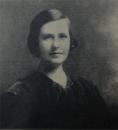Zora Cross was born in Brisbane, Queensland. She was educated at a number of schools in Brisbane and Sydney before attending Teachers' College. Cross taught primary school for some time, but left to give birth to her first child. Her first marriage (to Stuart Smith) failed and she eventually lived in a de facto relationship with David McKee Wright, the editor of the Bulletin's "Red Page" from 1916 to 1926.
Cross's first book of poetry, A Song of Mother Love, was published in 1916. In 1917 she published Songs of Love and Life, a collection of love-sonnets that have the distinction of being the first sustained expression in Australian poetry of erotic experience from a woman's point of view. Cross's poems appeared regularly in the Bulletin and she published several volumes of children's verse. She also published a number of novels in serial and book form, but they have attracted little critical attention. Her pamphlet An Introduction to the Study of Australian Literature (1922) has some historical interest, but her arguments no longer attract interest.
In her early teens, Zora Cross was a regular contributor to the 'Children's Corner' section of the Australian Town and Country Journal. In addition to her children's stories such as 'Clem's Ride' (1906), a number of her letters and other items were published from time to time, and these include some interesting biographical material, etc. Her photo also appeared in the 'Our Young Contributors' column, in the Australian Town and Country Journal, 24 May 1905, (p. 38).
F. C. Brown claims to have been 'inseparable friends' with Cross from the time they first met during World War I, when Cross was editing a newspaper and organising concerts for soldiers about to leave for the front. In 'Zora Cross', The Australian Woman's Mirror, vol. 4, no. 17, 20 March, 1928, Brown provides some details of Cross's early life, including that she was given her first lessons in poetry by Mary Hannay Foott and that her father taught verse and was taught by Brunton Stephens. Some of her mother's relatives wrote for The Australian Woman's Mirror, and her paternal grandfather edited an early Brisbane newspaper, The Paddington Times.The article also includes a portrait photograph of Cross taken after she moved to the Blue Mountains.
After Wright's death in 1928, Cross was in serious financial difficulty. With freelance journalism and serial fiction she made a meagre income for her family. This was assisted by a small pension from the Commonwealth Literary Fund, but Cross's family continued to live in poverty. In later life she pursued an interest in Roman themes and travelled to Rome for research, but the intended trilogy was never finished. Zora Cross died of heart disease in 1964.

